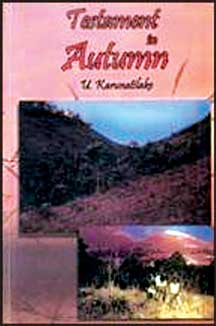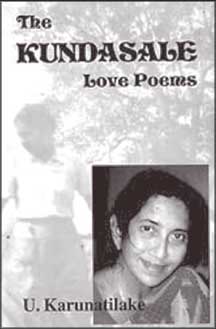|
U KARUNATILAKE'S LOVE POETRY:
'Everything... happens from the nature of the place'
 I referred last week to Seamus Heaney as the UK's poet laureate, but
I regret this was incorrect. He had actually declined the honour, not
surprisingly, as he had earlier written, "Be advised my passport's
green, No glass of ours was ever raised to toast the Queen." He has,
however, won practically every other distinction available to a poet,
including the Nobel Prize for literature in 1995. I referred last week to Seamus Heaney as the UK's poet laureate, but
I regret this was incorrect. He had actually declined the honour, not
surprisingly, as he had earlier written, "Be advised my passport's
green, No glass of ours was ever raised to toast the Queen." He has,
however, won practically every other distinction available to a poet,
including the Nobel Prize for literature in 1995.
U Karunatilake's poetic achievement is twofold. Not only is he Sri
Lanka's outstanding love poet, his love poetry is also outstanding for
its evocation of the spirit or sense of place. Indeed, love and location
go hand in hand in his poetry, and this is especially apparent in his
first volume entitled 'The Kundasale Love Poems.
These poems, as the author tells us in his preface, were occasioned
by the sudden death of his wife after "four decades of a passionate
marriage." What is remarkable about them is that they recreate the
happiness of a man and wife relationship even as they communicate the
desolation of its termination... Landscape plays a key role in the
reconciliation of these seemingly disparate experiences. 'On Track?'
seems to explain how this is achieved.
"The joy. Of seeing through your eyes Landscapes shifting slowly with
the train, Resolving motion on many axis, In many fields of force.
The gravitation of far silent waterfalls Or the wind blown random
race, Of close sounding cascades, Bouldered streams, Going with us or
the other way, Dropping beneath bridges into secret ravines Where,
through your eyes, we went trysting.
 Through your eyes the world caught the sun, All temptation and
promise. Through your eyes the world caught the sun, All temptation and
promise.
What could we renounce? Even with shrill hawks hanging on the air,
High above the tracks, in moody spirals, And the brown reminder Of leaf
fall in passing woods. Beautiful yet, as in my own stolen glance, You
were, at the carriage window.
Now comes the sudden dissolution Of the lens you lent. The landscape
loses motion, Dulls over. Too late for renunciation? Yes, even now my
lone vision Is tainted still with too much joy.
The sense of oneness with the beloved on those remembered train
journeys was such that he seemed to behold the passing scene through her
eyes. Now that he is alone that borrowed vision is lost. Yet, even his
solitary gaze is haunted with too much of the joy of the relationship to
permit him to renounce their love, even if it may seem "tainted" from
the religio-philosophical viewpoint. And it is the memory of their
mutual joy in the abiding landscape that validates this conclusion. Yet
location can also sharpen the sense of desolation, as we see in
'Gurudeniya':
"The boundaries waver between life and life There is past life in all
this landscape The old Ford stalled by an earth god's shrine Where the
Oya joined the river. The mossy slabs with lapping voices said 'Forsake
that machine And with the waters soft call Summon the boatman, he will
take you home.'
So across the earth brown river The boat cut Two miles from my
homeward run Rowed out of the yellow wild sunflowers Into the midstream
sun And the yellow zigzagging butterflies Going my way too, up the other
bank Over the hill to you, waiting Late for lunch and love.
Past life all this, Though may be still That once sweet home is there
by the hill And far at the rim of the valley The Sleeping Warrior with
his helmet on his chest Where the river falls from Dumbara.
But now where the car stalled The impounded river flows Over the
terraced fields and the Pitiya Devale And the old limestone bridge All
past life beneath its waters."
At the beginning the sense of place holds past and present together
in a delicate balance, giving the poet free rein for his memories. But
at the end the present asserts itself with the harsh fact that the
landscape of that time has been swallowed up by the damming of the
river. This scenic observation is what intensifies the poet's anguish at
the passing of life and love.
These two poems suffice to show how landscape is "deeply interfused"
with Karunatilake's poetic imagination. He does not need to resort to it
as imagery to illustrate his experience. Location is for him, as it was
for Wordsworth, an actual "presence that disturbs with the joy of
elevated thoughts." But unlike Wordsworth's, this poet's thoughts are
not of something that is ultimately undefinable. They supply the
conviction that the absence of the beloved, however grievous to bear,
cannot erase the experience of "passionate marriage" since the values of
devotion and fidelity associated with it are unconquerable even in
death.
 This magically catalytic function of landscape in Karunatilake's
poetry is reminiscent of a passage from Pasternak's short story,
'Letters from Tula', where he comments on the effect on this place
associated with the memory of Tolstoy on his imagination: "No wonder the
magnetic needles begin to dance here! Everything that happens happens
from the nature of the place. This is an event on the territory of
conscience. It occurs on her own ore-bearing regions." This helps to
explain the effect that places associated with his late wife have on
Karunatilake as he "mixes memory and desire". This magically catalytic function of landscape in Karunatilake's
poetry is reminiscent of a passage from Pasternak's short story,
'Letters from Tula', where he comments on the effect on this place
associated with the memory of Tolstoy on his imagination: "No wonder the
magnetic needles begin to dance here! Everything that happens happens
from the nature of the place. This is an event on the territory of
conscience. It occurs on her own ore-bearing regions." This helps to
explain the effect that places associated with his late wife have on
Karunatilake as he "mixes memory and desire".
What do we learn from this consideration of the spirit of place in
poetry? Not that it is indispensable for the making of successful
poetry, for there is much poetry, both ancient and modern, that has been
produced without it. What we learn is that it does add value, a whole
new dimension in fact, to the poetic experience when it is present: and
that the poetic output, whether of the individual poet or of the art as
a whole, would be the poorer for its absence. That such an absence seems
to have dominated much modern poetry is therefore a cause for concern.
It reflects the absence of concern for the landscape that has come to
dominate the modern consciousness generally. Wordsworth's reproachful
line of over two hundred years ago is over two hundred times more
relevant today: "Little we see in Nature that is ours." And Hopkins'
plea at the end of 'Inversnaid' that we make room for the natural world
is as much a plea to the poet as it is to the world:
"What would the world be, once bereft Of wet and of wildness? Let
them be left, O let them be left, wildness and wet; Long live the weeds
and the wilderness yet." That poets like Kumin, Heaney and Karunatilake
should have swum against the tide and remained rooted in location is,
therefore, an example worthy of emulation. It is an assertion of man's
need to be at one with the earth out of which he was formed, and a
reflection of the consciousness of an ultimately spiritual need.
|



